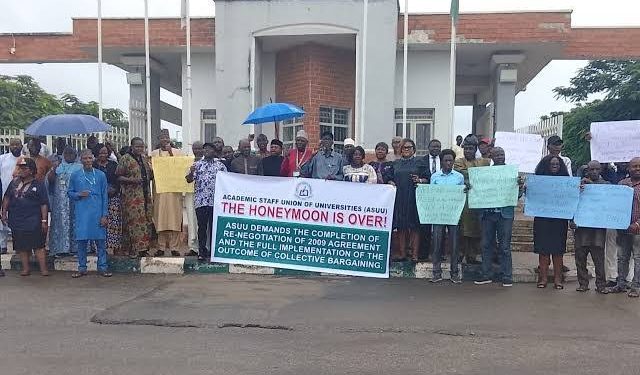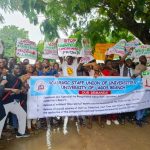Members of the Academic Staff Union of Universities (ASUU) staged peaceful protests across several campuses on Tuesday, demanding that the Federal Government implement agreements that have remained unresolved since 2009.
The demonstrations took place at institutions such as the University of Calabar, University of Ibadan, Obafemi Awolowo University, University of Nigeria Nsukka, University of Abuja, and others. Lecturers carried placards and banners as they decried unpaid salaries, stalled reforms, poor working conditions, and what they described as deliberate government delay tactics.
The union noted that despite signing multiple agreements with the government over the years, commitments to university funding, research grants, and improved salaries had not been honored. The protests also sought to draw attention to the recommendations of the Alhaji Yayale Ahmed report submitted in February 2025, which the government has yet to act upon.
At the University of Ibadan, the ASUU branch chairperson led members in a march across campus, condemning what he described as the government’s “keep them talking” strategy. He warned that lecturers were increasingly frustrated by repeated postponements, stressing that the union was aware of the planned meeting scheduled for August 28, but its members were no longer willing to be dragged along without results.
At Bayero University, Kano, the ASUU Vice-Chairman said the protest became inevitable after the government failed to act on renegotiated agreements. He recalled that negotiations concluded in December 2024, yet key provisions of the 2009 agreement remained unimplemented. The union’s demands include the payment of three-and-a-half months of withheld salaries from the 2022 strike, wage increases, full university autonomy, and the release of revitalisation funds. He warned that the government would bear responsibility for any disruption if the demands continued to be ignored. Students at the protest also urged the government to engage ASUU in meaningful dialogue to protect the academic calendar.
At Obafemi Awolowo University, lecturers carried placards with inscriptions such as “Lecturers Are Not Slaves” and “We Say No To Loans.” The branch chairman accused the government of neglecting academic staff and delaying critical funding for universities. He called on traditional rulers, religious leaders, and lawmakers to intervene and pressure the authorities into swift action.
At the University of Abuja, the ASUU chairman lamented that lecturers had remained on the same salary structure since 2009 despite repeated assurances of improvement. He said members were dying in increasing numbers, with 90 per cent of the deaths stress-related. He added that no country could rise above the strength and quality of its university education system. According to him, the union had shown patience with the current administration for two years, expecting it to tackle at least some of the long-standing issues, but nothing had been done.
He further rejected government proposals for loan arrangements, stressing that what lecturers needed was payment of outstanding entitlements, not credit facilities that they might never be able to repay. He insisted that the government should settle withheld salaries, promotion arrears, and the promised 25 per cent and 35 per cent wage awards before discussing any other options. He also urged the government to respect university autonomy and allow institutions to operate independently.
The root of the crisis dates back to the 2009 ASUU-Federal Government agreement and subsequent renegotiations. These agreements were designed to improve salaries, infrastructure, funding, and autonomy in federal universities. Despite repeated commitments, successive administrations have failed to implement the core provisions.
In May this year, ASUU warned the government to either implement the 2009 agreement or face a nationwide strike. The union’s president highlighted nine unresolved issues, including stalled renegotiations since 2017, withheld salaries from the 2022 strike, unfulfilled entitlements under the Integrated Payroll and Personnel Information System (IPPIS), delayed revitalisation funds, and unpaid academic allowances. Promises to provide N150 billion to universities and to adjust irregular allowances by 2026 have not materialised, while the adoption of the University Transparency and Accountability Solution (UTAS) as the official payment system remains pending.
Tuesday’s nationwide demonstrations reflect a deepening frustration among lecturers who insist that without urgent government action, the country’s university system will continue to suffer, with dire consequences for students and national development.










